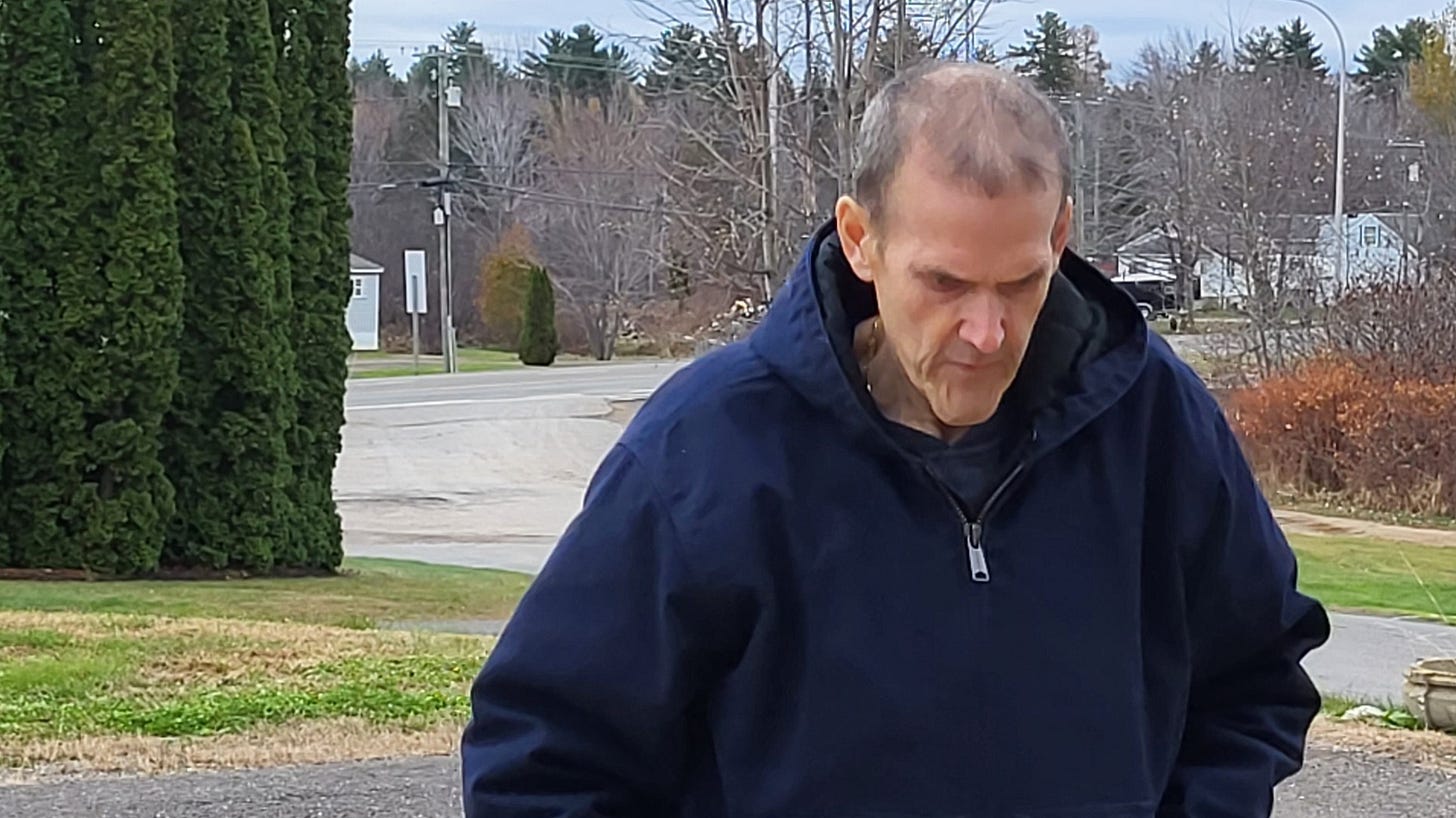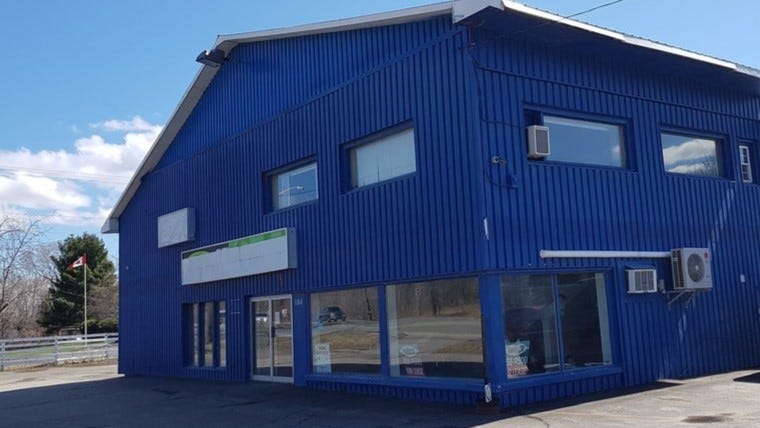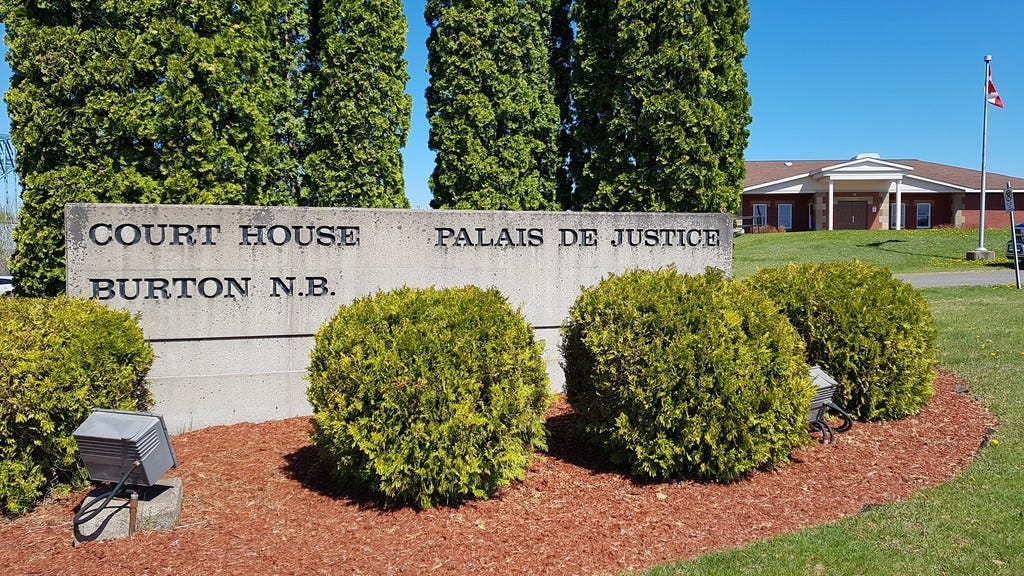Used-car dealers admit to fraud
Peter Geoffrey Kennedy, 58, and William (Willie) Cornford, 55, owners of shuttered W&P Auto Sales, pleaded guilty Tuesday to fleecing clients of vehicles and money
Two Fredericton men who operated a northside user-car dealership admitted Tuesday to numerous counts of fraud related to how they operated the business and misled customers about car loans.
Peter Geoffrey Kennedy, 58, of no fixed address, and William (Williie) Cornford, 55, of Mataya Drive in Pepper Creek on Fredericton’s north side, appeared in the Burton Courthouse on Tuesday before Court of King’s Bench Justice Thomas Christie, scheduled for trial on numerous counts of fraud.
However, court heard that rather than proceed to trial, both defendants were planning on pleading guilty to some of the charges before the court.

Kennedy pleaded guilty to 14 counts of fraud that he committed in 2018 and 2019, all involving customers who bought cars W&P Auto Sales Ltd. on Riverside Drive, a dealership he and Cornford owned and operated at the time.
The business was founded in 2016 and closed the summer of 2019 after complaints mounted and fraud allegations arose.
Those 14 counts against Kennedy involved customers who traded in previous vehicles when buying vehicles at W&P, who bought those trade-ins from the dealership or who paid for additional coverage/services that the defendant never fulfilled.
Cornford pleaded guilty Tuesday to two counts of fraud, stemming from loans he took out on vehicles he sold to clients - including his own brother - in 2019
Loans on trade-ins left unpaid
Agreed statements of facts were read into the record for both defendants, and each accepted all of the allegations as read by Crown prosecutor James McConnell as being true.
The prosecutor said most of the fraud counts against Kennedy stemmed from deals in which customers would trade-in their existing vehicles to buy new-to-them cars or trucks from W&P Auto Sales in 2018 and 2019.
Time and time again, McConnell said, Kennedy would tell clients the dealership would pay off their existing car loans for their trade-ins as part of the transaction.
But Kennedy wouldn’t pay those loans, court heard, and when customers contacted him to say they were still seeing loan payments deducted from their accounts, he’d delay by telling them it would take time for the paperwork to go through.
Kennedy would also e-transfer affected customers money to cover their loan payments for a little while, McConnell said, but invariably, those payments would cease.
Customers discovered they were still on the hook for those loan payments, the prosecutor said, or their vehicles would be repossessed.
He noted two of the frauds to which Kennedy admitted Tuesday stemmed from W&P reselling the trade-ins that still had liens on them from the previous lenders. Kennedy kept that from those who bought the trade-ins.
Those customers - Roxy Palmer and Lisa Burke - saw the cars they’d bought from W&P repossessed.
Many of Kennedy’s victims saw their credit affected negatively due to Kennedy’s scheme, McConnell said, while others are still paying off vehicles they no longer have.
He said Kennedy also fleeced two customers by selling them options that he never filed on their behalf. The prosecutor said Mary Spencer did a trade-in and purchase transaction with Kennedy at W&P in May 2018, and the defendant sold her “optional disability insurance.”
Spencer later learned the insurance company never received the application, McConnell said.
Similarly, he said, Joseph Levesque paid Kennedy for an additional warranty for a car he bought at W&P in February 2019, but he later learned Kennedy didn’t pay the company for the added coverage.
Desperate attempt to keep business afloat
Cornford pleaded guilty to just two of the fraud charges before the court Tuesday, and the prosecutor said unlike the case with Kennedy, it appears Cornford didn’t benefit from his illegal scheme but rather was scrambling to keep the dealership going.
Cornford knew the business “was having significant cash-flow issues,” McConnell said, and he was going to extreme lengths to keep it from collapsing.
Court heard Cornford took out a second mortgage on his home and secured loans from friends, and he poured that money into W&P Auto Sales.
Despite those problems, the prosecutor said, Cornford took no steps to slow things down.

“He kept operating the business in the hopes it would recover,” McConnell said, adding the defendant appeared to give no thought to the risk in which he was placing property belonging to customers.
One of those customers was Frank Jewett, who bought a 2015 Polaris Ranger XP 900 from Cornford at W&P for $20,000 on April 23, 2019, court heard. What he didn’t know, the prosecutor said, was that Cornford got a loan on that vehicle two weeks earlier for more than $12,000.
Cornford admitted he used that loan to keep W&P operating and received none of the money for his personal benefit.
Court heard he did something similar with regard to a Ford F150 Lariat he’d sold to his brother, Charlie Cornford, and his wife Nancy Cornford in 2017.
McConnell said Willie Cornford, using an old registration for the truck that was still in his name, secured a $52,000 loan without his brother and sister-in-law’s knowledge, and again, he poured that money back into the dealership.
Court heard the Polaris was never repossessed because Zag Bank wrote off the loan to Cornford, but the F150 Lariat was repossessed, though eventually Charlie and Nancy Cornford were able to get it back.
Community-based sentences to be recommended
Christie scheduled sentencing for both offenders for Feb. 1, and he ordered the preparation of a pre-sentence report for Kennedy and victim-impact statements for the numerous people affected by the pair’s crimes.
Lawyer Ben Reentovich, representing Cornford, said his client didn’t need a pre-sentence report.
Court heard the Crown and defence would be presenting joint recommendations on sentence for both men.
Reentovich noted the joint recommendation for his client would be a community-based conditional sentence, to be served under house arrest.
The court didn’t get any indication of what the recommendation for Kennedy might be, and Christie asked the prosecutors if they were seeking to have him remanded pending the sentencing hearing.
McConnell said the Crown wasn’t seeking to remand Kennedy ahead of sentencing, and was content for him to remain subject to the conditions of a police undertaking barring him from contact with the victims.
Outside the courthouse Tuesday morning, Patrick Hurley, Kennedy’s defence counsel, confirmed the joint recommendation for his client would also be a conditional sentence.
McConnell also told the judge Tuesday that the Crown was planning on withdrawing several other charges after sentencing.
Previous charges stayed due to delay
Cornford had faced an earlier prosecution alleging similar fraud offences but involving corporate clients.
He had been scheduled to stand trial in the Court of King’s Bench this spring on 14 counts of fraud, seven of uttering forged documents, three thefts and one count of making a false statement.
But Reentovich, who represented Cornford in that case as well, brought an application for a stay of proceedings, arguing the case had exceeded the deadline to get to trial as set out in a key Supreme Court of Canada precedent.
King’s Bench Justice Terrence Morrison, in a written decision issued March 6 on the stay application, agreed, finding that Cornford’s charter right to a trial in a timely manner had been violated.
Morrison said the only remedy for the egregious nature of the charter breach was to stay the charges as requested, meaning that previous case against Cornford came to a halt with no finding of guilt or acquittal.
The charges involving commercial complainants were initially laid in July and November 2020.
Morrison wrote that regardless of which date one used to calculate the timeline of that case, it missed the 30-month timeline for the conclusion of the case, as directed by the Supreme Court of Canada, and there were no particularly unusual circumstances that could allow for a rare exception.
The Crown had argued there was an exceptional circumstance: the COVID-19 pandemic. Prosecutors pointed out the provincial court judge set to preside over the preliminary inquiry in the original Cornford case fell ill and had to self-isolate, forcing a postponement of that proceeding.
But Morrison pointed out that after the preliminary inquiry, the Crown was slow to file the indictment with the Court of King’s Bench, forcing a further delay.
He ruled the Crown failed to demonstrate it took steps to mitigate any of the compounding delays in the case.
The combined Kennedy/Cornford prosecution wasn’t subject to the same timeline, as those charges were laid in court at a later date, and the Crown filed a preferred indictment, allow it to skip the preliminary-inquiry phase.
Don MacPherson can be contacted at ftonindependent@gmail.com.




